Tooth Injury and Dental Trauma
Endodontists are dentists who specialize in treating traumatic dental injuries. With their advanced skills, techniques and technologies they often can save injured teeth. If you have a cracked or injured tooth, find an endodontist near you right away.
Frequently Asked Questions about Tooth Injury and Dental Trauma
What is endodontic treatment?
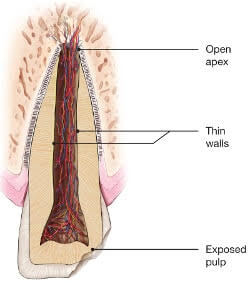 “Endo” is the Greek word for “inside” and “odont” is Greek for “tooth.” Endodontic treatment involves the inside of your tooth. Inside your tooth, under the white enamel and a hard layer called the dentin, is a soft tissue called pulp. It contains blood vessels, nerves, and connective tissue, and creates the surrounding hard tissues of the tooth during its development.
“Endo” is the Greek word for “inside” and “odont” is Greek for “tooth.” Endodontic treatment involves the inside of your tooth. Inside your tooth, under the white enamel and a hard layer called the dentin, is a soft tissue called pulp. It contains blood vessels, nerves, and connective tissue, and creates the surrounding hard tissues of the tooth during its development.
The pulp extends from the crown of your tooth to the tip of the roots, where it connects to the tissues surrounding the root. It’s vitally important to your tooth’s growth and development, however, once your tooth is fully mature it can survive without the pulp; your tooth continues to be nourished by the tissues surrounding it.
Who performs the endodontic treatment?
Endodontists are dentists with advanced training in root canal treatment and provide only endodontic services in their practices. They become root canal specialists after having completed dental school and an additional two or more years of advanced training in endodontics. You can feel confident visiting an endodontist for anything from routine to difficult and very complex endodontic procedures, including endodontic surgery. Endodontists also are experienced at diagnosing complex oral and facial pain.
How will my injury be treated?
CHIPPED OR FRACTURED TEETH
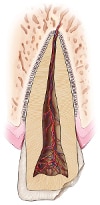 If you’ve chipped or fractured your tooth’s crown, it can be repaired either by reattaching the broken piece or by putting a tooth-colored filling in place. If a significant part of your tooth crown is broken off, an artificial crown or “cap” may be needed to restore the shape and function of the broken tooth.
If you’ve chipped or fractured your tooth’s crown, it can be repaired either by reattaching the broken piece or by putting a tooth-colored filling in place. If a significant part of your tooth crown is broken off, an artificial crown or “cap” may be needed to restore the shape and function of the broken tooth.
When the pulp is exposed or damaged after a chipping or crown fracture, root canal treatment may be needed.
Injuries in the back teeth, such as fractured cusps, cracked teeth require root canal treatment and a full coverage crown to restore function your tooth. More seriously injured split teeth will require extraction.
DISLODGED (LUXATED) TEETH
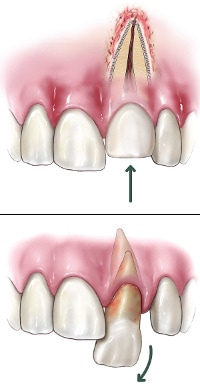 During an injury, a tooth may be pushed sideways, out of or into its socket which are referred to ‘luxation’. Your endodontist or general dentist will reposition and stabilize your tooth. Root canal treatment is usually needed for permanent teeth that have been dislodged. Root canal treatment may be started several days following the injury. Medication may be put inside your tooth as part of the root canal treatment; once treatment is complete with root canal filling and has been deemed successful a permanent root canal filling or crown will be put in place at a later date.
During an injury, a tooth may be pushed sideways, out of or into its socket which are referred to ‘luxation’. Your endodontist or general dentist will reposition and stabilize your tooth. Root canal treatment is usually needed for permanent teeth that have been dislodged. Root canal treatment may be started several days following the injury. Medication may be put inside your tooth as part of the root canal treatment; once treatment is complete with root canal filling and has been deemed successful a permanent root canal filling or crown will be put in place at a later date.
Children ages 12 and under may not need root canal treatment since their teeth are still developing. New research indicates that stem cells present in the pulps of children can be stimulated to complete root growth and heal the pulp following injuries or infection. When a child’s tooth is injured, an endodontist or dentist will monitor the healing carefully and intervene immediately if any unfavorable changes appear. Multiple follow-up appointments are likely to be needed. Continued monitoring with follow-up visits is important to prevent tooth loss by not missing the proper timing of the treatment.
KNOCKED-OUT (AVULSED) TEETH
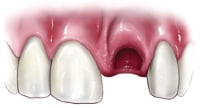 If one of your teeth is completely knocked out of your mouth, see an endodontist or dentist immediately. Time is of the essence and if you receive treatment quickly, preferably within 30 minutes, there is a good chance to save your tooth.
If one of your teeth is completely knocked out of your mouth, see an endodontist or dentist immediately. Time is of the essence and if you receive treatment quickly, preferably within 30 minutes, there is a good chance to save your tooth.
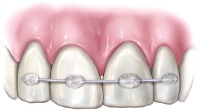 Handle a knocked-out tooth very carefully and don’t touch the root surface. Keeping the tooth moist will help increase the likelihood of saving your tooth. Your endodontist or dentist will evaluate the tooth, place it back in its socket and examine you for any other dental and facial injuries. A stabilizing splint will be placed for the next few weeks. Depending on the stage of root development, your dentist or endodontist may start root canal treatment a week or two later.
Handle a knocked-out tooth very carefully and don’t touch the root surface. Keeping the tooth moist will help increase the likelihood of saving your tooth. Your endodontist or dentist will evaluate the tooth, place it back in its socket and examine you for any other dental and facial injuries. A stabilizing splint will be placed for the next few weeks. Depending on the stage of root development, your dentist or endodontist may start root canal treatment a week or two later.
HORIZONTAL ROOT FRACTURES
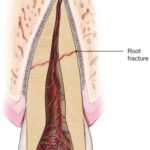 A traumatic to your tooth may also result in a horizontal root fracture. The location of the fracture determines the long-term health of your tooth. The closer a fracture is to the root tip, the better the chances of success and long-term health; fractures closer to the gum line are more debilitating for your tooth. Sometimes, stabilization with a splint is required while the tooth heals.
A traumatic to your tooth may also result in a horizontal root fracture. The location of the fracture determines the long-term health of your tooth. The closer a fracture is to the root tip, the better the chances of success and long-term health; fractures closer to the gum line are more debilitating for your tooth. Sometimes, stabilization with a splint is required while the tooth heals.
Do traumatic dental injuries differ in children?
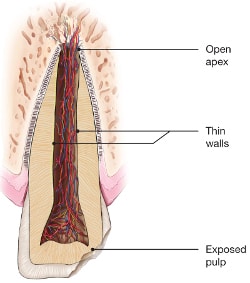 Chipped primary (baby) teeth can be esthetically restored. Dislodged primary teeth can, in rare cases, be repositioned. However, primary teeth that have been knocked out typically should not be replanted because it may cause further and permanent damage to the underlying permanent tooth bud that is growing inside the bone.
Chipped primary (baby) teeth can be esthetically restored. Dislodged primary teeth can, in rare cases, be repositioned. However, primary teeth that have been knocked out typically should not be replanted because it may cause further and permanent damage to the underlying permanent tooth bud that is growing inside the bone.
Children’s permanent teeth that are not fully developed at the time of the injury need special attention and careful follow up. visits, but not all of them will need root canal treatment. In an immature permanent tooth, blood supply to the tooth and stem cells in the region may enable your dentist or endodontist to stimulate continued root growth.
Endodontists will do all that is possible to save the natural tooth and have the knowledge and skill to treat incompletely formed roots in children so that, in some instances, the roots can continue to grow. Look to these specialists for information and their expertise when your child is the victim of dental trauma.
Will the tooth need any special care or additional treatment?
Resorption occurs when your body, through its own defense mechanisms, begins to resorb your own tooth in response to the traumatic injury. Following an injury, you should return to your dentist or endodontist to have the tooth examined and/or treated on a regular basis for a few years to ensure that root resorption is not occurring and that surrounding tissues continue to heal. Unfortunately, some types of resorption are untreatable.
